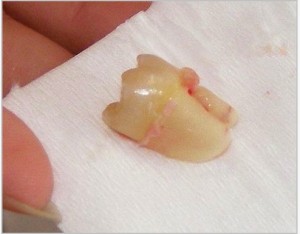
A dental extraction (also referred to as exodontia) is the removal of a tooth from the mouth. Extractions are performed for a wide variety of reasons, including tooth decay that has destroyed enough tooth structure to render the tooth non-restorable. Extractions of impacted or problematic wisdom teeth are routinely performed, as are extractions of some permanent teeth to make space for orthodontic treatment.
The most common reason for extraction is tooth damage due to breakage or decay. There are additional reasons for tooth extraction:
- Severe tooth decay or infection (acute or chronic alveolar abscess). Despite the reduction in worldwide prevalence of dental caries, still it is the most common reason for extraction of (non-third molar) teeth with up to two thirds of extractions.
- Supernumerary teeth which are blocking other teeth from coming in.
- Severe gum disease which may affect the supporting tissues and bone structures of teeth.
- In preparation for orthodontic treatment (braces)
- Teeth in the fracture line
- Teeth which cannot be restored endodontically
- Fractured teeth
- Supenumerary, supplementary or malformed teeth
- Prosthetics; teeth detrimental to the fit or appearance of dentures
- Insufficient space for wisdom teeth (impacted third molars). Although many dentists remove asymptomatic impacted third molars, both American and British Health Authorities recommended against this routine procedure, unless there are evidences for disease in the impacted tooth or the near environment. The American Public Health Association, for example, adopted a policy, Opposition to Prophylactic Removal of Third Molars (Wisdom Teeth) because of the large number of injuries resulting from unnecessary extractions.
- Cosmetic; teeth of poor appearance, unsuitable for restoration
- Receiving radiation therapy to the head and neck area may require extraction of teeth in the field of radiation.
- Deliberate, medically unnecessary, extraction as a form of physical torture.
- It was once a common practice to remove the front teeth of institutionalized psychiatric patients who had a history of biting.
- Reduced cost compared to other treatments